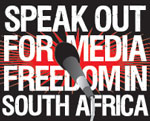
Subscribe & Follow
#AfricaMonth
In the news
No more media repression, warns SANEF as Zuma calls for fairness

Black Wednesday
"SA is now a democracy where the Jimmy Krugers are no more, and where diverse voices are competing for space," SANEF chairman Mondli Makhanya said, speaking yesterday, Wednesday, 19 October 2011, at the 'Black Wednesday' event held at Institute for the Advancement of Journalism (IAJ).
While he was hoping that no journalist will ever go to jail, the former Sunday Times editor, however, hinted that the Constitution can be defied by those who feel threatened by free reporting, as it is the case in many parts of the African continent and in the post-9/11 US.
The relationship between the SA media and the Zuma administration seems to have hit rock bottom, with the government constantly complaining about inaccurate and unfair reporting, and labeling the press 'the enemy of the revolution and the people'.
Presidency calls for fairness
And yesterday the Presidency called for fairness, objectivity and open-mindedness in the coverage of government and especially of the head of state.
"We have noted with great concern, how the coverage of the President in particular, has become trapped in two story lines," Zuma's spokesperson Mac Maharaj said in a statement.
"On this national Press Freedom Day, we humbly urge the media and analysts to exercise their minds openly and widely, analyse each action or decision on its own merits, and avoid pigeonholing and stereotyping."
Reinforce suspicions
But, given the hostile and intense climate editors, journalists and media commentators are now operating in - arrest of journalists at crime scenes, refusal of ministers to answer critical questions, threat of a media appeals tribunal, repressive laws such as Protection of Information Bill ('Secrecy Bill') and many more - the Presidency's warning may only reinforce suspicions that SA could well be on its way to experiencing another 'Black Wednesday'.
SANEF yesterday revealed that it will fiercely oppose any trends that may reflect the return of Black Wednesday in SA.
"We should not allow"
"Today we are far, far away from that time and we never want to go back... We should not allow people who want to close the free space of information to triumph," he said.
Nevertheless, Makhanya took a swipe at his colleagues, urging them to do a thorough soul-searching to see if they are real truth-tellers. He called on journalists to ask themselves if they are really telling the full truth, adding that the media have to ensure that their reporting's ethical standards withstand any sort of manipulation.
As the country's civil society, led by Right2Know Campaign, is engaged in an intense battle to ensure that free access to information, press freedom and freedom of expression are not suppressed by the much-feared Secrecy Bill, R2K coordinator Glenda Daniels urged journalists to get deeply involved in.
"Go out there and fight"
"The media seem to be on the back foot," Daniels said, calling on journalists and civil society to link up, fight together, understand each other and learn from one another. "You cannot expect NGOs to fight this media freedom battle for you; it can't be done. Journalists should be more imaginative and go out there and fight."
While the media fraternity yesterday rallied around SANEF to celebrate 15 years of the forum's existence, the Media Development and Diversity Agency (MDDA) felt that media freedom is for all citizens and not just for media practitioners.
MDDA CEO Lumko Mtimde said every citizen, irrespective of their social class, where ever located, rural or urban, poor or rich, should have access to a choice of a diverse range of media. He also called for support to create an enabling environment for media development and diversity.
Access to all media
As Mtimde urged the country to ensure that rural communities have access to all media, including radio, TV, online, mobile and print services, the SOS Support Public Broadcasting called on the Department of Communications (DoC) to move swiftly ahead on its broadcasting policy review process, to enact new citizen-centred and citizen-focused broadcasting laws.
The Media Monitoring Africa (MMA) also yesterday launched its Principles for Reporting on Children in the Media - the editorial guidelines it said will offer practical tips for media professionals on how to report and interview children.















